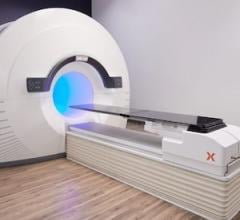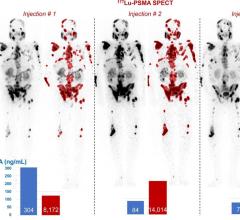March 20, 2014 — The U.S. Food and Drug Administration (FDA) approved a third beta-amyloid plaque positron emission tomography (PET) imaging radiotracer to identify Alzheimer’s disease. The FDA’s approval of Piramal Imaging’s Neuraceq (florbetaben F-18 injection) comes four weeks after receiving marketing authorization in Europe.
It is the third
radiotracer to gain FDA clearance for beta amyloid plaque imaging. Last October, the FDA-cleared Vizamyl (flutemetamol F-18 injection) was developed for GE Healthcare by Medi-Physics Inc. The first agent to gain approval was
Amyvid (florbetapir F-18 Injection) in April 2012. Amyvid was developed by Eli Lilly & Co. and Avid Radiopharmaceuticals Inc. Prior to these agents, the only clear diagnosis of Alzheimer’s was by post-mortem autopsy.
Neuraceq is indicated for PET imaging of the brain to estimate beta-amyloid neuritic plaque density in adult patients with cognitive impairment who are being evaluated for Alzheimer's disease (AD) and other causes of cognitive decline.
There are an estimated 7.7 million new cases of dementia each year worldwide.[1] Alzheimer's disease accounts for 60-80 percent of all dementia diagnoses.[2] However, a clinical diagnosis of probable AD is incorrect upon post-mortem histological investigation in 10-30 percent of cases.[3]
The Centers for Medicare and Medicaid Services (CMS) declared it will cover a beta-amyloid PET scan for patients under Coverage with Evidence Development (CED) programs. The objective of these programs is to assess the impact of beta-amyloid scans on improving patient outcomes or advancing patient treatment options.
"Alzheimer's disease or any form of cognitive impairment is a daunting diagnosis," said Ludger Dinkelborg, director of the board, Piramal Imaging. "For the patients and caregivers, the concern centers around understanding what the future holds. For physicians, the challenge is properly assessing the patient and determining the best care path."
"The FDA's approval of Neuraceq is a significant milestone for Piramal Imaging and demonstrates our dedication to advancing innovation in molecular imaging globally," said Swati Piramal, vice chairperson, Piramal Enterprises Ltd. "The rising prevalence of Alzheimer's disease and cognitive impairment is being felt individually and collectively around the world. Our goal as a company is to usher in a new era of imaging that helps paint clearer pictures of the physiology of such conditions and helps improve patient outcomes."
The FDA approval of Neuraceq is based on safety data from 872 patients who participated in global clinical trials as well as three studies that examined images from adults with a range of cognitive function, including 205 end-of-life patients who had agreed to participate in a post-mortem brain donation program. Images were analyzed from 82 subjects with post-mortem confirmation of the presence or absence of beta-amyloid neuritic plaques. Correlation of the visual PET interpretation with histopathology in these 82 brains demonstrated that Neuraceq accurately detects moderate to frequent beta-amyloid neuritic plaques in the brain and is a useful tool to estimate the density of these plaques in life.
Piramal Imaging has partnered with IBA Molecular for manufacturing and distribution of Neuraceq. IBA Molecular owns and operates a network of 49 PET isotope facilities worldwide, a network that is unique in both size and scope.
Neuraceq Indications and Use
A negative Neuraceq scan indicates sparse to no amyloid neuritic plaques and is inconsistent with a neuropathological diagnosis of AD at the time of image acquisition; a negative scan result reduces the likelihood that a patient's cognitive impairment is due to AD. A positive Neuraceq scan indicates moderate to frequent amyloid neuritic plaques; neuropathological examination has shown this amount of amyloid neuritic plaque is present in patients with AD, but may also be present in patients with other types of neurologic conditions as well as older people with normal cognition.
Neuraceq is an adjunct to other diagnostic evaluations.
The FDA limits established for this radiotracer include that a positive Neuraceq scan does not establish the diagnosis of AD or any other cognitive disorder. Also, the safety and effectiveness of Neuraceq have not been established for predicting development of dementia or other neurologic conditions or for monitoring responses to therapies.
In clinical trials, the most frequently observed adverse drug reactions in 872 subjects with 978 Neuraceq administrations were injection/application site erythema (1.7%), injection site irritation (1.2%) and injection site pain (3.9%).
References:
1. WHO. Dementia: A public health priority; 2012
?2. Alzheimer's Association. Alzheimer Dement. 2013;9 ?





 February 06, 2026
February 06, 2026 









